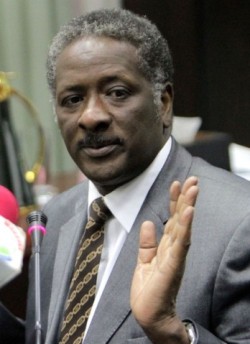Sudan’s finance minister says IMF, World Bank meetings “positive”
October 17, 2013 (KHARTOUM) – The Sudanese finance and national economy minister Ali Mahmood Abdel-Rasool hailed the 2013 annual meetings of the Boards of Governors of the International Monetary Fund (IMF) and the World Bank (WB) that took place in Washington this month saying they were “good” and “positive”.

He was accompanied to those meetings by the central bank governor Mohamed Khair al-Zubair and Undersecretary at the Ministry of Finance Youssef Abdullah Al-Hussein.
The Sudanese official also noted a technical workshop that took place on the sidelines with the participation of South Sudan and African Union (AU) mediator Thabo Mbeki devoted to discussing how to obtain relief for Sudan’s external debt.
Khartoum inherited the entire debt burden that existed prior to the secession of the south in July 2011 and is making the required payments on them as the two countries have yet to agree on how to split up the debt.
Abdel-Rasool commended the role played by Mbeki on the debt issue and support he provided to efforts of the Sudanese government.
He said that the meeting discussed issues of common interests with South Sudan in the fields of development and technical fields.
The Sudanese minister also revealed that he met with officials at the US Department of the Treasury in which he described as positive and successful.
Khartoum and Juba have agreed to work jointly to reach out to creditors seeking cancellation for the $40 billion plus debt burden.
As it stands now, the IMF projects that Sudan’s external debt as percentage of GDP will increase this year to 87.6% from 82.2% in 2012
Around three quarters of Sudan’s external debt are owed to the Paris Club of creditor nations and other non-member states. The remaining balance is equally divided between commercial banks as well as international and regional financial bodies.
But many observers believe that securing such commitment from creditors will be an uphill battle.
Last April, an IMF official said that it will be near impossible for Sudan to secure debt relief even if it satisfied technical and economic requirements.
“I’m not saying this is impossible but it is difficult because it is linked to political issues which requires a public relations effort with member countries” IMF deputy director of the Middle East and Central Asia department Edward Gemayel said during a visit to Khartoum.
He pointed out that any debt relief deal with Sudan would require the unanimous consent of all 55 countries in Paris Club which he suggested would be improbable.
(ST)
